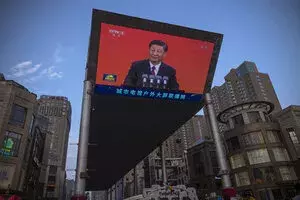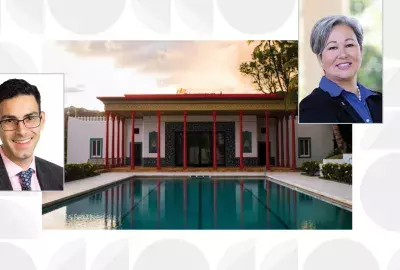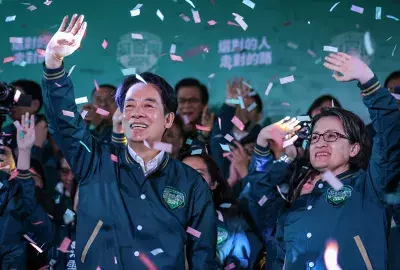Error message

OFFICE/DEPARTMENT
As he consolidates absolute control, China’s Xi Jinping will also have to answer for a host of crises
By Richard Hornik
Quick Take:
- Xi Jinping seems set to become China’s most powerful leader since Mao Zedong, but the complex challenges he faces appear intractable—and the downside to supreme authority is total responsibility.
- While Xi inherited many of these problems, such as an aging population, wealth inequality, and stagnating productivity, he and his advisors have created two of the most immediate ones: the repercussions of Xi’s Zero COVID policy and China’s deepening real estate crisis .
HONOLULU (Feb. 10, 2022)—In November, more than 300 members of the Communist Party of China’s Central Committee ratified a “Resolution on Major Achievements and Historical Experience of the CPC’s 100 Years of Endeavors.” It was only the third such resolution since the party was founded 100 years ago, and it placed Party Secretary Xi Jinping on the same ideological plane as Deng Xiaoping and Mao Zedong.
But with absolute power comes absolute responsibility. Xi’s full coronation as China’s supreme leader will come this fall at the 20th Party Congress, but in the coming months he will face a long list of challenges that will define his reign. The problems include many that Xi inherited—a demographic time bomb of population aging, income and wealth inequality, a lack of leading-edge innovation, and stagnating productivity. However, there are two that are particularly salient, and both have been created by Xi and his closest policy advisers.
Zero-COVID predicament
China is justifiably proud of limiting COVID deaths to fewer than 5,000, and Beijing has trumpeted that success, citing it as evidence that China’s authoritarian model is superior to other systems. But “Zero COVID” required drastic national lockdowns, cutting China off from the rest of the world until enough of its citizens could get vaccinated.
Unfortunately, China’s homemade vaccines are not highly effective, and for reasons of national pride it refused to distribute the Pfizer-BioNTech vaccine—even though it manufactures it for other countries. Two years into the pandemic, tens of millions of China’s urban dwellers still find themselves locked down for weeks.
Meanwhile, China’s borders remain closed to the outside world even as the rest of the globe progressively gains more immunity to COVID-19. There are great concerns—evident in the extreme precautions surrounding the Winter Olympics—about what will happen when China eventually opens up and the virus comes into contact with its huge, ineffectively immunized population. Staying cut off from the world creates other problems, particularly economic ones, but it’s hard to see how Xi could admit his policy was a mistake.
A deepening debt crisis
Xi did not create the real estate crisis that now haunts Chinese (and global) financial markets, but his efforts to deflate the bubble have sent the property market into a free fall. Many of China’s biggest real estate developers now face bankruptcy. The fallen giant Evergrande, for example, has roughly $300 billion in loans that it cannot service.
The impact of this crisis has only begun to be seen. Since apartments are the primary source of equity for the middle class, declining values reduce their wealth. And poor land sales hurt local government finances just when there is greater demand for services.
But Xi’s team was in a bind. Real estate had become unaffordable, and the central government cannot be seen to be bailing out every big company because China is on the edge of a debt meltdown. Over the last 15 years, the CCP unleashed massive amounts of credit to keep GDP growth—and the party’s own legitimacy—high, but that avalanche of debt has diminishing returns. It now takes three times more investment than a decade ago to produce one additional unit of Chinese GDP.
Real growth can only come from innovation and productivity, but Xi has bet all his cards on the woefully inefficient state sector. China’s private companies' rate of return on assets is more than double that of state-owned enterprises. In addition, one of China’s most important sources of economic and commercial innovation was the online technology sector, but Xi’s fear of parallel power centers has led to a regulatory crackdown on e-commerce, ride-sharing, gaming, and many other industries that has wiped out more that $1 trillion in market value.
Xi has successfully consolidated supreme authority, but it comes with a price. Policies that are personally connected to a supreme leader are harder to alter—much less reverse—without a dangerous loss of face. If there are problems, officials down the line are often loath to report them for fear of damaging their careers, and the need for policy corrections can take longer to become clear. As a result, China may now be at an inflection point that will determine whether it continues its ‘peaceful rise’ or enters an era of potentially dangerous stagnation.
During his extensive career in journalism and media education, East-West Center Adjunct Senior Fellow Richard Hornik served, among many other positions, as Time magazine’s bureau chief in Beijing and Hong Kong. This commentary builds on a recent presentation he gave for the Center’s China Seminar series.
Photo: Chinese President Xi Jinping appears on a big screen in Beijing as the city prepared for the centenary of the Communist Party of China last June. Credit: Andrea Verdelli/Getty Images
As he consolidates absolute control, China’s Xi Jinping will also have to answer for a host of crises
By Richard Hornik
Quick Take:
- Xi Jinping seems set to become China’s most powerful leader since Mao Zedong, but the complex challenges he faces appear intractable—and the downside to supreme authority is total responsibility.
- While Xi inherited many of these problems, such as an aging population, wealth inequality, and stagnating productivity, he and his advisors have created two of the most immediate ones: the repercussions of Xi’s Zero COVID policy and China’s deepening real estate crisis .
HONOLULU (Feb. 10, 2022)—In November, more than 300 members of the Communist Party of China’s Central Committee ratified a “Resolution on Major Achievements and Historical Experience of the CPC’s 100 Years of Endeavors.” It was only the third such resolution since the party was founded 100 years ago, and it placed Party Secretary Xi Jinping on the same ideological plane as Deng Xiaoping and Mao Zedong.
But with absolute power comes absolute responsibility. Xi’s full coronation as China’s supreme leader will come this fall at the 20th Party Congress, but in the coming months he will face a long list of challenges that will define his reign. The problems include many that Xi inherited—a demographic time bomb of population aging, income and wealth inequality, a lack of leading-edge innovation, and stagnating productivity. However, there are two that are particularly salient, and both have been created by Xi and his closest policy advisers.
Zero-COVID predicament
China is justifiably proud of limiting COVID deaths to fewer than 5,000, and Beijing has trumpeted that success, citing it as evidence that China’s authoritarian model is superior to other systems. But “Zero COVID” required drastic national lockdowns, cutting China off from the rest of the world until enough of its citizens could get vaccinated.
Unfortunately, China’s homemade vaccines are not highly effective, and for reasons of national pride it refused to distribute the Pfizer-BioNTech vaccine—even though it manufactures it for other countries. Two years into the pandemic, tens of millions of China’s urban dwellers still find themselves locked down for weeks.
Meanwhile, China’s borders remain closed to the outside world even as the rest of the globe progressively gains more immunity to COVID-19. There are great concerns—evident in the extreme precautions surrounding the Winter Olympics—about what will happen when China eventually opens up and the virus comes into contact with its huge, ineffectively immunized population. Staying cut off from the world creates other problems, particularly economic ones, but it’s hard to see how Xi could admit his policy was a mistake.
A deepening debt crisis
Xi did not create the real estate crisis that now haunts Chinese (and global) financial markets, but his efforts to deflate the bubble have sent the property market into a free fall. Many of China’s biggest real estate developers now face bankruptcy. The fallen giant Evergrande, for example, has roughly $300 billion in loans that it cannot service.
The impact of this crisis has only begun to be seen. Since apartments are the primary source of equity for the middle class, declining values reduce their wealth. And poor land sales hurt local government finances just when there is greater demand for services.
But Xi’s team was in a bind. Real estate had become unaffordable, and the central government cannot be seen to be bailing out every big company because China is on the edge of a debt meltdown. Over the last 15 years, the CCP unleashed massive amounts of credit to keep GDP growth—and the party’s own legitimacy—high, but that avalanche of debt has diminishing returns. It now takes three times more investment than a decade ago to produce one additional unit of Chinese GDP.
Real growth can only come from innovation and productivity, but Xi has bet all his cards on the woefully inefficient state sector. China’s private companies' rate of return on assets is more than double that of state-owned enterprises. In addition, one of China’s most important sources of economic and commercial innovation was the online technology sector, but Xi’s fear of parallel power centers has led to a regulatory crackdown on e-commerce, ride-sharing, gaming, and many other industries that has wiped out more that $1 trillion in market value.
Xi has successfully consolidated supreme authority, but it comes with a price. Policies that are personally connected to a supreme leader are harder to alter—much less reverse—without a dangerous loss of face. If there are problems, officials down the line are often loath to report them for fear of damaging their careers, and the need for policy corrections can take longer to become clear. As a result, China may now be at an inflection point that will determine whether it continues its ‘peaceful rise’ or enters an era of potentially dangerous stagnation.
During his extensive career in journalism and media education, East-West Center Adjunct Senior Fellow Richard Hornik served, among many other positions, as Time magazine’s bureau chief in Beijing and Hong Kong. This commentary builds on a recent presentation he gave for the Center’s China Seminar series.
Photo: Chinese President Xi Jinping appears on a big screen in Beijing as the city prepared for the centenary of the Communist Party of China last June. Credit: Andrea Verdelli/Getty Images
East-West Wire
News, Commentary, and Analysis
The East-West Wire is a news, commentary, and analysis service provided by the East-West Center in Honolulu. Any part or all of the Wire content may be used by media with attribution to the East-West Center or the person quoted. To receive East-West Center Wire media releases via email, subscribe here.
For links to all East-West Center media programs, fellowships and services, see www.eastwestcenter.org/journalists.







